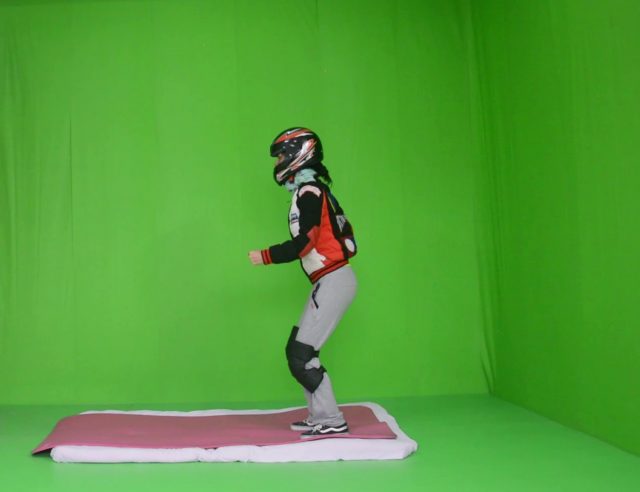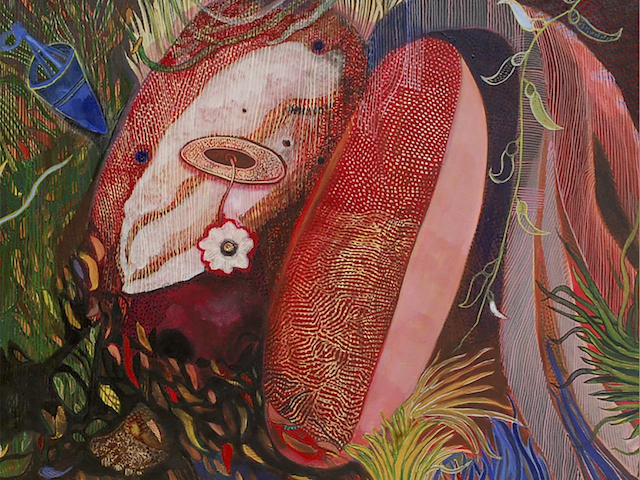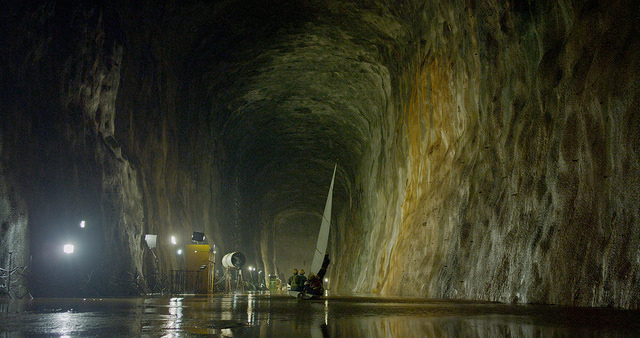This is a rectangular dream / which inevitably brings forth a rectangular waiting / a floating country can’t pillow a broken dream / and I’ve never dared say goodnight

December 6, 2018
Plastic 12: From Iron Moon, An Anthology of Chinese Migrant Worker Poetry, editor Qin Xiaoyu contextualizes the terms and conditions of factory work backdropping the poetry of Xie Xiangnan and Bing Ma.
The following introduction has been condensed from its original version first published by China Writers’ Publishing House as The Verse of Us: Contemporary Workers’ Poetry (2015), and in English by White Pine Press (2016).
Read poems by Xie Xiangnan and Bing Ma below, in both their Chinese and English lives.
Remembering the Anonymous
introduction by Qin Xiaoyu, translated by Eleanor Goodman
The term “iron moon” comes from a poem by Xu Lizhi, who was born in 1990 and worked in a Foxconn factory making Apple products until his suicide in 2014. An assembly line worker, he wrote more than two hundred largely unhappy poems before his death. Perhaps his best known poem is “I Swallowed an Iron Moon”:
I swallowed an iron moon
they called it a screw
I swallowed industrial wastewater and unemployment forms
bent over machines, our youth died young
I swallowed labor, I swallowed poverty
swallowed pedestrian bridges, swallowed this rusted-out life
I can’t swallow any more
everything I’ve swallowed roils up in my throat
I spread across my country
a poem of shame
The iron moon is a powerful symbol of the hardships so-called “migrant workers” such as Xu Lizhi face in their daily lives. The concept of the migrant worker first appeared in China in 1984, when the researcher Zhang Yulin began surveying the development of towns and cities, which, along with the rise of industry, brought large numbers of rural residents from the countryside into the cities for the first time. This group of people became known as migrant workers, pointing to their status as outsiders in their own country. The policy that underpinned this movement of population was “Document 1,” presented by the national government on January 1, 1984, which allowed rural residents to take their grain rations and go out to look for work. . . .
In May of 1990, a Hong Kong-financed factory making raincoats for export to America and Europe caught fire, causing the death of eighteen people. This was the first major fire at a foreign-backed enterprise and it brought the issue of worker safety into the public eye. According to government statistics, the average number of workers killed in work-related accidents in any given year is around 100,000. With the lack of professional training, inadequate or hazardous worksites, an absence of basic protections, long hours and extremely demanding work, China leads the world in workplace injuries, occupational diseases, and psychological problems. . . . Nevertheless, it took continuous calls to implement the “Safety Production Law” and “Prevention and Treatment of Occupational Diseases Law,” both of which faced considerable resistance. In 1992, Deng Xiaoping went on his southern speaking tour, and in 1993, the central government put out a statement saying that it would vigorously develop the labor market, and encouraging excess labor forces from the countryside to move into the cities. This gave rise to a wave of migrant workers that for a time increased exponentially; today, more than 274 million people have contributed in this way to China’s economic development. Along with this, however, came a host of problems, including left behind and homeless children, empty-nesters, an increased divorce rate, and so on. These painful stories of abandoned hometowns have become a principle theme for worker-poets. . . .
The term “migrant worker” itself has long been subject of debate. Some workers have begun to oppose its usage, arguing that the term is discriminatory, since it is often used in a derogatory context and carries a pejorative connotation. However, the origin of the term is in fact found in sympathetic scholarly work where it describes this relatively new phenomenon. Not only was it devoid of pejorative connotation, it was intended to be a term of admiration. It also expresses the circumstances of these traveling laborers, which is one reason the term gained popularity. It is also a highly inclusive concept, while still indicating that this group’s fundamental difficulties stem from the sharp division between city and countryside. These migrant workers must cross the literal and invisible barriers between the two worlds of the city and the countryside, and continually pay the price for it.
The poetry of migrant workers is frequently called “labor poetry.” “Labor” implies working for a boss and being paid piecemeal. In the language of a capitalist marketplace economy, which entered the country via Hong Kong to Guangdong in the 1980s, the term implies the commercialization of the labor force. Along with the marketization of China’s economy, and the expansion of capitalism, such terms gradually replaced the vocabulary of the older socialist labor system and began to underpin how workers view their own work. The romanticization of migrant worker poetry has come from a kind of exploitation of and encroachment on the image of the laborer; however, the use of “labor poetry” is also problematic, as it emphasizes a specific social role and combines workers of different types with different lives into one category. It also presents a fantasy that is easily exploited, and too readily turned into a story of social harmony and achieving one’s dreams.
Migrant worker poetry has its origins in the wave of migratory labor that began in the 1990s, when a very small number of workers with an interest in literature or culture began to write about the experiences they had in factories far from their hometowns. This created a separate category of poetry, written by those in the lowest rungs of society. Among them, Xie Xiangnan, [whose poem is excerpted below], stands out. In 1992, not long after Deng Xiaoping’s southern speaking tour, Xie left school and his hometown in Hunan to travel to Zhejiang to find work. That same year, he began to write poetry. Over the next few years, he bounced between the Pearl River Delta and his hometown, working as a construction worker, assembler at a toy factory, docker at an electroplate factory, fitter at a paper plant, machine-tool operator at an electronics factory, and so on. This life of constantly changing jobs and moving back and forth between countryside and city is a common experience among migrant workers. . . .
Screws, worker ID cards, work numbers, stations, assembly lines, uniforms, order forms, iron and steel, workshops, machine consoles, sulfuric acid, presses, antistatic clothing, antistatic gloves, denatured alcohol, solvents, dust, die molds, controls, gears, blueprints, coolants, anti-rust oils, fire doors, electrical components, tool bits. The abstract Marxist concept of ‘relations of production’ is transformed by these concrete details of the factory into ‘production relationships.’ The worker-poets use these details to express the alienated work that goes on in these factories and inside the production system, exposing the domination of capitalism from the inside. . . .
Although male migrant workers outnumber female migrant workers by a ratio of approximately 2:1, there are more women than men working in factories producing consumer goods for export. However, . . . very few women have joined the ranks of worker-poets. In [the complete anthology of 31 poets], there are only four female poets represented [one of whom, Zheng Xiaoqiong, is excerpted in the following post]. This lack of parity is only one indication that women are still treated as inferior in the countryside, where the patriarchal system still dictates. Girls are taught to be timid and are forced into silence, even after they have left home. . . .
In the Spanish border town of Portbou, the Israeli artist Dani Karavan has created a memorial to Walter Benjamin called “Passages,” on which is written in five different languages: “It is a more arduous task to honor the memory of anonymous beings than that of famous persons. The construction of history is consecrated to the memory of those who have no name.” Benjamin spent his life researching memory, and in his view, the history written by the victors is a typical form of historical violence. Those who suffer oppression, those who are forgotten, are once again crushed in the paeans of history, left out of what is passed down and acknowledged. The poetry of migrant workers in China is an offering “to the memory of those who have no name.”. . .
Production, in the Middle of Production, Is Soaked by Production
by Xie Xiangnan, translated by Eleanor Goodman
1.
My lungs tested by autumn
the dust I encountered was definite
I wasn’t floating
I was in the middle of production
I produced black and made white
and crawled into the cracks between black-white distinctions
I was in the middle of production
soaked by the moisture of production
I produced a table
the table held up the snowstorm for me
I made a bed
the bed installed a spring inside me
I raised a newspaper
the newspaper was eloquent and cheerless
I made a road public
and the umbrellas on the road were heartbroken
2.
My face tightens
and I have to rub my eyes
it hurts
there’s grit in them
Where’s the grit from
tell me
where’s the grit from
tell me
how can the grit be so large
tell me
the grit in my eyes
in my throat
in my bile
how long will it stay there
3.
Grit carried in by wind
blocks the season
burns out blood
a tree’s panting
a plot of land’s covering of leaves
I’m not like the plants
a mighty army of dust gallops through my chest
a magnificent wind
scrubs the trees clean
the lungs of this era
are crushed like asbestos
4.
In links
by deep links
deeper and deeper links
then, I’m baffled by the light
I’m a railroad tie under the light
I lie across an invisible dance
approaching an uncontrollable winter night
I’m inlayed in fire
still burning with fever, still producing
This is a rectangular dream
which inevitably brings forth a rectangular waiting
a floating country can’t pillow a broken dream
and I’ve never dared say goodnight to this enormous world
5.
The world’s factories cover the nightshift
the faces more wrinkled the more they’re rubbed
a pile of mouths, partly parched
a row of footprints, trampling other bodies, scratching
each other painfully. She lifts her hands, touches the heart of the night, and my heart
has been labeled
a riddle
Saturday has been labeled an occupational injury
6.
Finally, soaked lungs can rest
production is still the noise of the advance guard, accompanying
a ringing in the ears. The motor is inflamed
and I want to let it stop, this drop of water’s breathing
can’t moisten parched cracked lips, and I want to let it stop
its leaden breathing, drooping like the loudspeakers
dark substances are electric currents rushing forward
the heaviness makes its dam-breaking body
reassemble like the earth’s crust
7.
I have a few withered branches
I have a frozen burning
In my ice is the tongue
of hidden time, allergenic enzymes
I have sleepless dandruff
that was lost on the hard road
when I lightly touch my own hair
passing by the truncated street of midnight
I discuss paper airplane wings
with someone, some fat guy
along with his fear
《生产,在生产中,被生产淋湿》
谢湘南
1.
被秋天开胸验肺
我遭遇的灰尘如此绝对
我不玩漂浮
我在生产中
我生黑产白
在黑白的缝隙中爬行
我在生产中
被生产湿湿地淋湿
我生出一张桌子
桌子给我端出风雪
我产下一张睡床
睡床给我装上发条
我抚养一张报纸
报纸雄辩又冷淡
我公开一条路
路上雨伞断魂
2.
脸发紧
不得不,揉自己的眼睛
好痛啊
眼里有砂子
哪里来的砂子
请问
哪里来的砂子
请问
砂子为何如此巨大
请问
砂子为何如此巨大
请问
砂子要在眼睛里
在喉咙里
在胆汁里
待多久
3.
风中的砂子
挡住了一个季节
烙出血
一树的喘息
一地的落叶
我与植物不一样
我胸中跑着千军万马的灰尘
盛大的风
在洗刷树
时代的肺
石棉一样破败
4.
在连接里
被深深地连接
越来越深的连接
那一刻,我被光所迷惑
我是光中的一块枕木
我横亘在看不见的舞蹈中
我临着一个没有把手的寒夜
我被镶嵌在火中
持续高烧,持续生产
这是一个长方形的梦
也必然诞下长方形的等待
空中的国土枕不住碎梦
我从不敢对巨大的世界说晚安
5.
世界工厂覆盖夜班
面子越揉越皱
一堆嘴,局部干渴
一队脚印,踩着身体,彼此的
痒痛。她举起手,触摸到暗夜的心,我的心
被鉴定为
一个谜语
星期六被鉴定为工伤
6.
终于,淋湿的肺可以休息了
生产仍是前卫的噪音,伴随
耳鸣。马达患上炎症
我很想让它停止,这滴水的呼吸
滋润不了干裂的嘴唇,我很想让它停止
这铅色的呼吸,喇叭一样下垂
暗物质是奔突的电流
它沉重,让决堤的身体
地壳般重组
7.
我有一些枯了的树枝
我有冰冻了的燃烧
我的冰块里,藏着时间的
舌尖,过敏的酶
我有未睡的头皮屑
丢失在坚硬的路上
当我轻触自己的头发
走过午夜未遂的街道
我和谁谈论
纸机翼,一个胖子
和他的恐惧
Work Accident Joint Investigative Report
by Xie Xiangnan, translated by Eleanor Goodman
Gong Zhonghui
Female
20 years old
From Ji’an, Jiangxi
Work Number: z0264
Department: Plastics
Type of Work: Die cutting machine
Entered Factory: 970824
In the process of cutting plastic, the product did not appear, the safety door
did not open
the hand entered from the side to release
the product. The hand
touched
the safety door
and as it shut
it applied pressure
to the middle and ring fingers
at the second joint of the middle finger and first joint of the ring finger
which is considered a “transgression of factory safety operating procedures”
People reported
her hands were often burnt to blisters by the machine
people reported
she’d been working continuously for twelve hours
people reported after it happened she
didn’t cry and didn’t
scream she just held onto her fingers
and left
When it happened no one
was there to see it
《一起工伤事故的调查报告》
谢湘南
龚忠会
女
二十岁
江西吉安人
工卡号:Z0264
部门:注塑
工种:啤机
入厂时间:970824
啤塑时,产品未落,安全门
未开
从侧面伸手入模内脱
产品。手
触动
安全门
合模时
压烂
中指及无名指
中指二节,无名指一节
属“违反工厂 安全操作规程”
据说
她的手经常被机器烫出泡
据说
她已连续工作了十二小时
据说事发后 她
没哭 也没
喊叫 她握着手指
走
事发当时 无人
目 睹 现 场
To Squat or to Sit
by Bing Ma, translated by Eleanor Goodman
from May 9-10: Mengzi Road in Shanghai, at the Station under the Custody and Return Program
Numb after squatting, I sit down. At least
the hard wooden floor allows me to cross my legs
allows my ass sit
This ass has supported life’s
heaviest weight
To squat or to sit
the two numbing positions replace
the simple wish to go home
When sitting becomes squatting again
the distance between my ass and thighs yet again
sends humiliation and numbness out on further journeys
《蹲着,或者坐着》
冰马
蹲得发麻后,就顺势坐下。还好
硬木地板让双腿得以盘起
让屁股得以坐下
屁股承受了一生中
最沉重的力量
蹲着,或者坐着
这两种麻木的姿势不断交替着
回家的简单欲望
当坐姿再次换成蹲姿
屁股和大腿的距离重新
使屈辱与麻木向更多处游历



